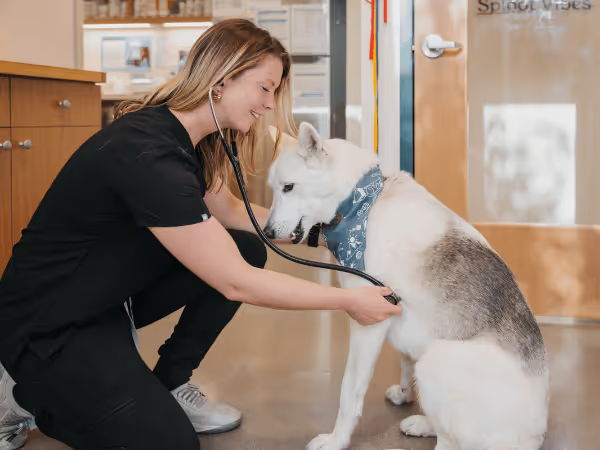Constipation in dogs is a common yet uncomfortable condition that can affect their quality of life and overall health. It happens when a dog has difficulty passing stools or has infrequent bowel movements, leading to discomfort, straining, or even pain.
Knowing the signs, causes, and treatments for constipation in dogs is key to helping your furry friend stay healthy and happy.
9 Common Signs of Constipation in Dogs
If your dog is experiencing constipation, there are several signs you might notice. Here are the most common signs of constipation in dogs:
- Hard, dry stools – Your dog’s poop offers plenty of clues about their health. When your dog is constipated, their stools may look like small, hard pellets or may seem dry and crumbly.
- Straining to defecate – When it’s time to go potty, your dog may squat for long periods without producing stool; this is one of the most common signs of constipation in dogs.
- Frequent circling and sniffing without pooping – These behaviors suggest that the dog feels the urge to defecate but is unable to do so, possibly due to constipation.
- Infrequent bowel movements – Is your dog taking fewer trips outside to relieve themselves or not pooping normally during walks? This can be a sign of constipation as well.
- Blood-streaked poop – When constipated, dogs may strain to pass hard stools, causing small tears in the dog’s rectum or anus; this can result in the appearance of red streaks of blood on their poop.
- Whining or yelping while pooping – This is an indication that your dog is in pain or experiencing discomfort while pooping. Pain while pooping can be either a symptom of constipation or the root cause of it.
- Loss of appetite – Dogs may skip meals due to stomach discomfort or if their colon feels full, which can happen when they are constipated.
- Lethargy – Low energy or seeming “off” could be tied to gastrointestinal trouble and abdominal pain, a common symptom of constipation.
- Swollen or tender abdomen – When dogs experience constipation, their belly may feel bloated or sensitive to the touch. They may also show reluctance or aversion to being touched around that area.
Note: If you are noticing one or more of the above signs of constipation in dogs, it may be time for an urgent vet care appointment. Sploot Vets is a provider of urgent and emergency vet services in Chicago, Denver, & Colorado Springs. Our doors are open 365 days a year, with extended clinic hours (8 AM to 8 PM). Call us for next steps→

Causes of Constipation in Dogs
While dehydration is one of the most common causes of constipation in dogs, there are also other potential causes related to diet, intestinal problems, and other underlying medical issues. Here are the most common causes of constipation in dogs:
- Dehydration in dogs – When a dog is not getting enough water, this can lead to dry, hard stools that are difficult to pass, resulting in constipation.
- Low-fiber diet – Lack of roughage makes it harder to move stool through the intestines; this can potentially lead to constipation in dogs.
- Lack of exercise – Regular movement helps promote bowel activity. Therefore, sedentary and overweight dogs may experience recurrent constipation.
- Ingesting foreign objects – Dogs may at times ingest items that cannot pass easily through their intestines (e.g., toys, bones, hair). These can block their digestive tract, resulting in constipation.
- Medication side effects – Some painkillers or supplements can slow digestion, potentially causing constipation in dogs.
- Anal gland issues – Dogs can develop anal gland issues when the glands don’t empty properly due to soft stools, inflammation, or infection. This leads to painful defecation, which can contribute to constipation.
- Joint pain and injuries – Any discomfort or pain in squatting can discourage dogs from pooping. The delay can result in stool buildup and hardening.
How to Treat Constipation in Dogs
Looking to alleviate your dog’s constipation? Here are some of the most common treatments. Though some of these remedies can be done at home, we always recommend calling a veterinarian. Constipation in dogs can be caused by something simple, like minor dehydration, or something serious like an intestinal blockage. Therefore, it’s always best to call a vet to be safe.
Note: We recommend calling an urgent care vet if your dog’s constipation is prolonged or accompanied by symptoms that indicate pain or discomfort.
1. Increase Your Dog’s Water Intake
Hydration softens stool and supports healthy digestion, which can alleviate constipation. Ensure your dog has access to fresh, clean water at all times. In addition, wet dog food and bone broth can help boost fluid intake if your pup isn’t drinking enough water.
2. Subcutaneous or IV Fluids
For dogs with severe dehydration (a common cause of constipation), veterinarians may administer fluids under the skin or directly into the vein. These treatments quickly rehydrate the body, helping to soften impacted stool and restore normal bowel function.
3. Add Dietary Fiber & Probiotics
Fiber helps regulate bowel movements and ease constipation in dogs. Try adding dog-friendly vegetables like pumpkin, broccoli, or green beans. You can also use vet-recommended supplements with added fiber and probiotics for dogs to support healthy digestion.
4. Encourage More Exercise
Physical activity stimulates intestinal movement. Daily walks, playtime, and other forms of exercise can help your dog’s digestive system function more smoothly and reduce the chances of constipation. These lifestyle changes can help, especially for sedentary and overweight dogs.
5. Use Vet-Approved Laxatives
Vet-prescribed stool softeners or laxatives for dogs can safely and quickly relieve constipation. For your dog’s safety, AVOID using medications formulated for humans, as these can be toxic for them.
6. Addressing Underlying Issues
In some cases, constipation in dogs isn't caused by dehydration, low fiber, or sluggish digestion. Instead, it can stem from deeper issues like pain, intestinal obstructions, or the ingestion of non-food items. For these more serious causes, here are the most common treatments:
- Pain management – If joint pain or injuries are making it hard for your dog to squat and poop comfortably, your vet may recommend pain relief or joint supplements for dogs.
- Surgical removal of intestinal blockages – When constipation is caused by an ingested foreign object, tumors, or intestinal twisting, emergency veterinary surgery may be required to clear the obstruction and restore proper digestion.

When to Seek Urgent Vet Care for Constipation in Dogs
When is constipation in dogs an urgent case? There are two main things to consider: duration and severity. If your dog has not pooped in the last 24 hours, call your veterinarian. They may either recommend a quick visit or further monitoring at home, along with some care instructions.
However, if your dog has not gone to the bathroom in the last 48 hours, this requires urgent veterinary attention. In addition, constipation in dogs accompanied by the following symptoms also needs urgent vet care:
- Showing symptoms of discomfort and severe pain
- Appears lethargic or has a bloated abdomen
- Blood-streaked stool or black (tarry) stool
- Vomiting
Sploot Vets: Urgent Care & Emergency Vet Services for Dogs
Need an urgent or emergency vet visit? Sploot Veterinary Care is here to help! Our clinics in Chicago, Denver, and Colorado Springs offer next-level, all-in-one vet care, encompassing primary care, urgent care, and emergency vet services.
We offer top-tier care and unparalleled availability. Our vet clinics are open 365 days a year for extended hours (8 AM to 8 PM).
With our dedicated team of experienced vets and modern facilities, you can be sure your dog is in good hands. Our clinics are equipped with spacious exam rooms, in-house diagnostics, and dedicated surgical suites. We handle more than 95% of your pet’s healthcare needs, with rates up to 60% lower than those of 24/7 vet ERs.
Easily arrange an urgent care or emergency vet appointment at Sploot by calling us at (720) 770-8656.






